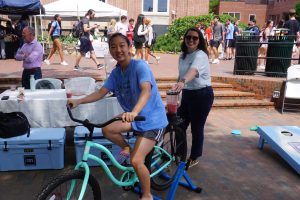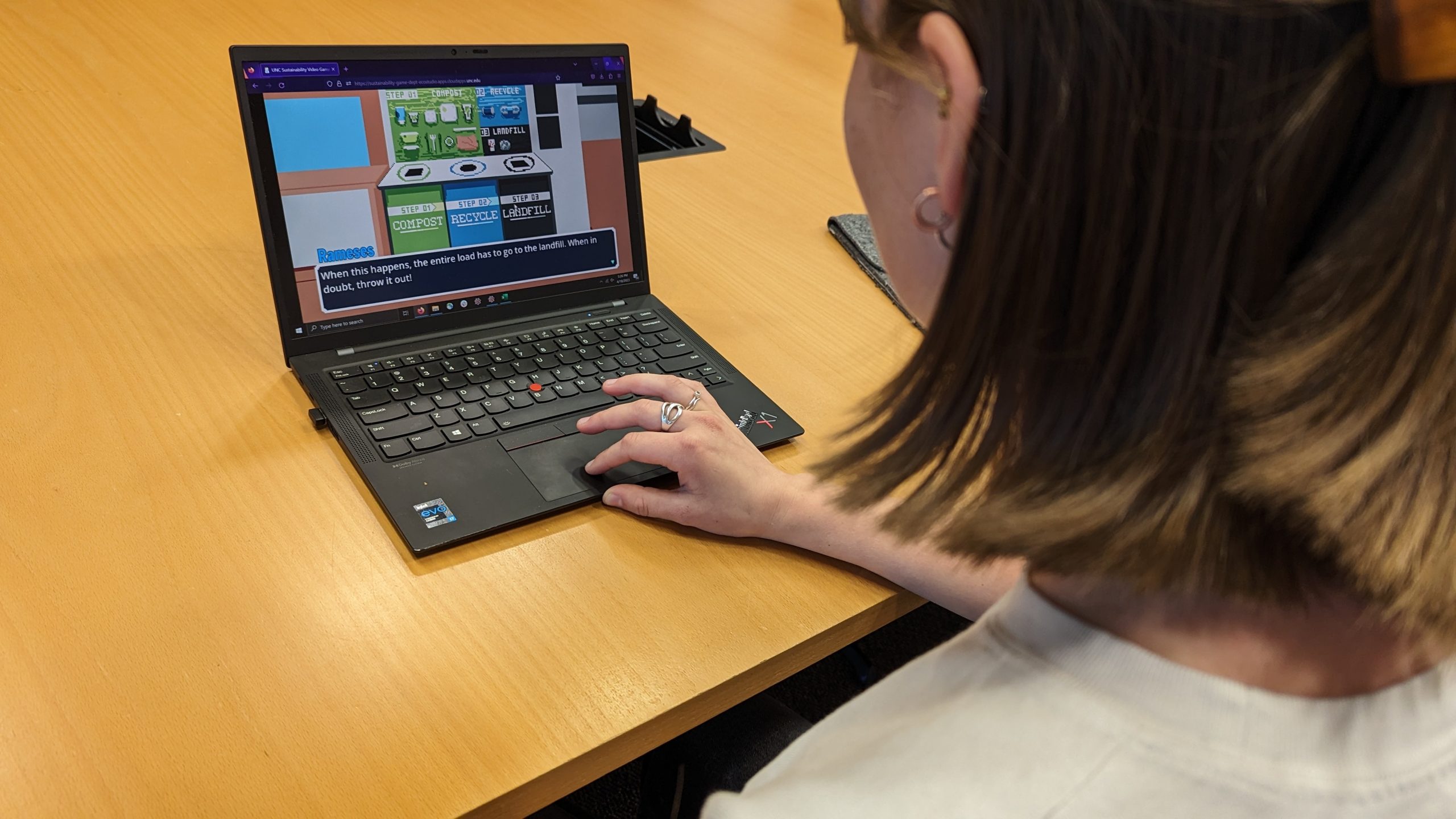
Original story by Maya Waid, an undergraduate student in the UNC Hussman School of Journalism and Media. Edited for the Sustainable Carolina blog.
Amy Xu has wanted to create video games ever since she was a kid. Xu was proficient in HTML and general coding knowledge at a young age. As she continued to play video games, she began to study the design and creative aspects that made the games enjoyable.
Xu, a first-year student at UNC-Chapel Hill, only ever saw video games as a side hobby. That is, until she had the opportunity to join the UNC-CH Game Development Club. After doing so, she participated in game jams – weekend events in which participants design prototype games. In her first semester, Xu developed three video games.
One night while on the club’s Discord server, Xu came across an internship application. Xu’s interest piqued at the chance to develop a video game for a professional organization and applied immediately.
Sustainable Carolina, who hosted the internship, was looking for individuals with video game design experience and coding knowledge. Melanie Elliott, the sustainability analyst at Sustainable Carolina, advertised the position after getting her idea for a video game approved in November 2022. She had written a script for the project, but needed a student who could help turn her ideas into an interactive game.
A Game to Improve Environmental Stewardship
In her role, Elliott oversees both long- and short-term projects focused on sustainability. Elliott found her love for sustainability while completing her undergraduate degree in physics at Carolina. After switching to the renewable energy track, she focused most of her time on environmental efforts.
The video game that Xu is helping to create will be an educational tool accessible to Carolina students through the Sustainable Carolina website.
“The video game that we’re making walks students through some of their daily activities and supports them in making more sustainable choices,” said Elliott. “There are all sorts of decisions that we make every day that seem insignificant, but make a big impact.”
Elliott’s goal with the video game is to inform undergraduate students of programs at Carolina helping to improve the environment.
“It is important to be a good steward and an advocate for the environment. We need to make sure that we’re leaving a good space for future generations,” said Elliott.
One of Sustainable Carolina’s largest goals is for the University to be carbon neutral by 2040. Their Climate Action Plan details how this can be achieved.
Part of Carolina’s goal is to comply with Governor Roy Cooper’s Executive Order 80 for a 40% statewide greenhouse gas emission reduction by 2025 and a 50% reduction by 2030. The Climate Action Plan details 23 strategies that can be followed to reach the targets set by the state.
First-year Erica Pope recognizes that the University provides the resources for students to be sustainable, it is just a matter of consistently taking advantage of them.
“It’s easier to be more environmentally conscious at Carolina because they give you the resources,” said Pope. “When you walk out of the dining hall, you have compost, recycling and trash. It gives students more options and makes it easier to create a healthier and more sustainable environment. Students just need to utilize the resources.”
Game Creation and Finishing Touches

Teaching students what to do with the resources is Xu’s main goal with her video game, which focuses on five locations on campus: a dorm, laundry room, bathroom, dining hall and an arena.
“In the game, you go through a day on campus with Rameses. In different locations you learn about campus programs and statistics at the same time,” said Xu.
Xu has spent the last few months drawing art for the game, coding and incorporating sustainability information with Elliott’s help. The game was recently tested with a first-year seminar class. The class was administered a sustainability quiz before and after playing the game to test its effectiveness and student retention.
Being able to see that her work has paid off has been the biggest reward thus far of Xu’s internship.
“I wanted to see how I could get these facts to stick with people and what kind of game design choices would make it so that they learn effectively,” said Xu. “The fact that I got proof that people are actually getting it was the most rewarding part for me.”
After the first round of testing, Elliott and Xu completed another round of testing. They are now making final tweaks to the game. Both hope that students not only learn sustainable practices but also incorporate them into their daily lives.
“This video game is to get people interested in sustainability and hope that somebody is going to want to further research things they can do,” said Xu. “A larger public awareness of sustainability in general is important. Hopefully, by getting this into people’s minds they realize any effort they make beyond the game is helpful.”
